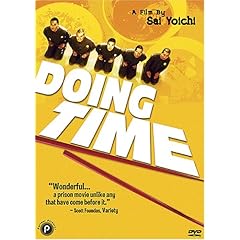Does intent matter?
/Up until I was in my late twenties in San Francisco, there were many places where I could practice gongfu outside, even when it was raining. Sheltered areas in parks, tunnels, the overhangs of buildings, even thick tree canopies were available as public space. Now there are almost no public sheltered spaces because bums were using them for sleeping.
Our legal system is based on assessing a persons moral intent to do harm. A bum sleeping in the park is intending to sleep. They don't intend to make our quality of life worse, so we don't feel morally right punishing them for the destruction of public space.
 Japanese society has no such problem because they don't care about moral intent. They treat crime as a problem of impulse control. This point is beautifully and brilliantly illustrated in the film Doing Time by Sai Yoichi
Japanese society has no such problem because they don't care about moral intent. They treat crime as a problem of impulse control. This point is beautifully and brilliantly illustrated in the film Doing Time by Sai Yoichi. A guy goes to prison for the crime of wanting to feel the power of firing a pistol. He shoots into a bucket of water alone in a rural area but he gets caught anyway and sent to prison.
Almost all Japanese convictions come with a confession. (Historically in China, all convictions required a confession.) Prison in Japan is not a place to punish, it is an isolated environment where people with weak impulse control get an opportunity to develop it.
If I ever teach high school students again, I think I'll make this film required viewing.
 This is important in the realm of martial arts because the pivotal term here, the operative word, is intent or yi in Chinese. Many internal and external martial artists claim that intent is the most important part of practice.
This is important in the realm of martial arts because the pivotal term here, the operative word, is intent or yi in Chinese. Many internal and external martial artists claim that intent is the most important part of practice.
You can have a really clear and strong intent and still not get the results you want. Our good intentions do not necessarily produce good results. Intent can actually be a type of aggression that stops us from experiencing subtlety. Highly focused intent can even make us blind to what is right in front our our faces.
In our legal system we also make a distinction between pre-meditated intent and spontaneous intent.
I'm honestly not sure how to explain the difference between the Chinese term yi and the English term intent, but I thought this little discussion about impulse control might generate some insights.
Note: Yoyogi park, in central Tokyo, has a designated area for people to permanantly camp-out. It is clean and safe, and kind of edgy weird experimental.
